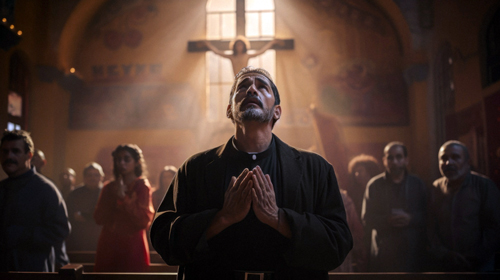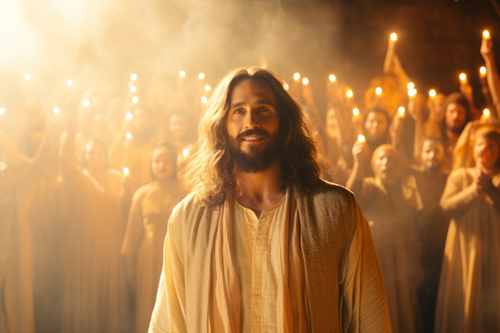A.W. Tozer’s The Knowledge of the Holy is a reflective and reverent exploration of the attributes of God, aimed at restoring a high and proper view of God in the hearts and minds of believers. Tozer begins with the urgent concern that the modern church has lost its sense of the majesty and holiness of God. He asserts that what comes into our minds when we think about God is the most important thing about us, because it shapes everything else—our worship, our ethics, our understanding of reality. He laments that even among Christians, the idea of God has been reduced to manageable proportions. This diminished view, he says, is not only dishonoring to God but also destructive to humanity. The path to spiritual recovery, therefore, begins with a restoration of the knowledge of the Holy—the recognition of who God truly is, in all His transcendent glory.
Tozer stresses that God can only be truly known as He reveals Himself. Human reason, though valuable, is inadequate by itself to comprehend divine majesty. The finite cannot fully grasp the infinite, but it can apprehend what God graciously chooses to disclose. Therefore, the knowledge of God must be rooted in revelation—through Scripture, through Christ, and through the inner witness of the Spirit. Tozer also distinguishes between knowing about God and truly knowing God. The former may lead to religion, but the latter leads to worship. This experiential knowledge transforms the heart, awakens awe, and compels obedience. The purpose of theology, in Tozer’s view, is not to master facts but to be mastered by the truth of God’s person.

Throughout the book, Tozer examines what he calls the “perfections” of God—the divine attributes that make up His character. He approaches each one with reverence, insisting that these are not abstract qualities but living realities that should evoke worship and surrender. He starts with the incomprehensibility of God, emphasizing that while we can know God truly, we can never know Him exhaustively. This paradox humbles us. We are invited to draw near, but we must never presume. The unknowable God has made Himself known, and this condescension is a marvel. For Tozer, mystery is not a barrier to faith but a doorway to adoration.
Tozer then turns to the self-existence of God. God is not a created being; He depends on nothing outside Himself. He is the uncaused cause, the eternal I AM. This truth sets God apart from all created things. While everything else is contingent, He is necessary. Recognizing God’s self-existence helps us see the absurdity of pride. We are not self-made or self-sustaining; we live by borrowed breath. The doctrine of divine aseity is not just a philosophical notion but a call to humility. It teaches us that God is sovereign and independent, and we are dependent creatures in need of grace.
The self-sufficiency of God flows naturally from His self-existence. God does not need anything from His creation. He is complete in Himself, eternally satisfied in the fellowship of the Trinity. Tozer argues that God did not create out of necessity but out of love. This has profound implications for worship. God is not a beggar looking for attention; He is a King deserving of reverence. Our worship does not add to God’s glory—it is our response to who He already is. Tozer urges believers to rid their hearts of the idea that God needs them. Rather, it is we who desperately need Him.
The eternity of God is another attribute that Tozer treats with wonder. God is timeless. He exists outside the succession of moments. For Him, there is no past or future—only an eternal now. This truth challenges our limited perspective and invites us to trust in God’s perfect timing. While we are bound by time, God sees the end from the beginning. Nothing surprises Him. This should comfort the believer, especially in times of uncertainty. Tozer notes that because God is eternal, His promises are enduring. What He has spoken will come to pass, not because of the strength of our faith but because of the constancy of His nature.
God’s infinitude follows closely behind His eternality. Tozer describes God as boundless, unlimited in every way. His power, knowledge, love, and presence know no limits. This is a terrifying and exhilarating truth. It means that God is bigger than our problems, greater than our sins, and more magnificent than our highest thoughts. But it also means that He cannot be controlled, predicted, or manipulated. Tozer encourages believers to bow before the immensity of God. The right response to the infinite is not calculation but surrender. It is not our job to measure God, but to yield ourselves to Him without reservation.
The immutability of God—the fact that He never changes—is another comfort to the believer. In a world of constant flux, God remains the same. His character does not evolve; His promises do not expire. Tozer writes that God’s unchanging nature is the foundation of our trust. If God were fickle, faith would be futile. But because He is the same yesterday, today, and forever, we can rely on His word. This does not mean that God is static. He is dynamic in His actions but consistent in His essence. His mercies are new every morning, yet they flow from an eternal well that never runs dry.
Tozer then moves to the divine attribute of omniscience. God knows all things perfectly and effortlessly. He never learns, because He already knows everything. This includes all facts, all possibilities, and all hearts. Tozer warns against trivializing God’s knowledge by thinking He only knows what is public. God sees the thoughts and intents of the heart. He knows our motives, our struggles, our secret sins. But rather than inducing fear, this truth should foster honesty. Since nothing can be hidden from Him, we are free to come into the light. God’s omniscience means that He is never surprised by our failures, and His love is extended with full awareness of who we are.
God’s wisdom is His ability to apply His knowledge in the best possible way. Tozer says that divine wisdom always chooses the highest end through the best means. Often, we do not understand God’s ways, but faith rests in the confidence that He makes no mistakes. Tozer emphasizes that God’s wisdom is active in our lives, even when we cannot trace it. In times of suffering or confusion, this truth can be an anchor. We are not at the mercy of random events but in the care of an all-wise Father who works all things together for good.
The omnipotence of God—His unlimited power—is another attribute that inspires awe. Tozer says that God can do whatever He wills, and no one can hinder Him. His power is never diminished by its exercise. Unlike human strength, which wanes with use, divine power is infinite and undiminished. This power was displayed in creation, in the resurrection of Christ, and in the transformation of sinners. Tozer points out that the greatest demonstration of divine power is not in acts of force, but in mercy and grace. The God who holds the universe together also stoops to lift the brokenhearted. Power in God is always in harmony with His holiness and love.
God’s omnipresence—the reality that He is everywhere present—is not a metaphor but a mystery. Tozer explains that God is not spread thin like a substance, but wholly present in every place. He is not bound by spatial dimensions. This means that we are never outside His reach. Whether in the heights of joy or the depths of despair, God is there. Tozer encourages believers to practice the presence of God, to cultivate an awareness that He is nearer than breath. This awareness transforms ordinary moments into sacred ones. The believer need not go to a temple to find God; He dwells with the humble and contrite wherever they are.
The faithfulness of God is His unwavering commitment to His word and His people. Tozer writes that God never forgets, never fails, never falters. What He promises, He performs. This attribute is the basis for hope. Human relationships may disappoint, but God’s loyalty is absolute. He does not love us today and reject us tomorrow. His covenant stands firm. Tozer highlights that divine faithfulness is not earned—it is part of who God is. Even when we are faithless, He remains faithful, for He cannot deny Himself. This should lead not to presumption but to gratitude and repentance.
God’s goodness is the generosity of His nature. Tozer defines it as the will to bless and give. All that God does is good, not because it conforms to a standard, but because He is the standard. The universe is not ruled by blind fate or cruel necessity but by a God who delights in giving life and joy. Tozer argues that the goodness of God is often misunderstood because people equate goodness with comfort. But God’s goodness may include discipline and suffering if it leads to a greater blessing. Ultimately, the cross is the supreme revelation of divine goodness—a holy God bearing the penalty of sin to redeem sinners.
The justice of God assures us that He is morally perfect and will always act in righteousness. Tozer explains that divine justice is not separate from God’s love or mercy but works in harmony with them. God does not overlook sin, but He has provided a way for sinners to be justly forgiven through Christ. Justice is not cruelty but fairness. It means that God will one day set all things right. This should sober us, for we will all give account, but it should also encourage us, for it means that evil will not triumph forever. Tozer calls believers to live with integrity, knowing they serve a just and holy Judge.
God’s mercy is His goodness extended to the miserable and undeserving. Tozer emphasizes that mercy is not a weakness but a sovereign choice to bless those who cannot help themselves. God’s mercy flows from His nature, not from our merit. It is infinite, inexhaustible, and always available. Tozer urges readers to approach God not with fear but with confidence in His mercy. Repentant sinners will never be turned away. Even believers who fall repeatedly can find restoration. Mercy is the heartbeat of the gospel—it is why God sent His Son, and it is what sustains us in our weakness.
God’s grace is closely related to mercy, but Tozer distinguishes it as the active outpouring of God’s favor. Grace not only withholds punishment but bestows blessings. It is unearned, unmerited, and freely given. Tozer insists that grace is not a passive sentiment but a powerful force that transforms lives. It is grace that saves, sanctifies, and strengthens. The believer’s life is not a ladder climbed by effort but a gift received by faith. Tozer warns against turning grace into license or taking it for granted. True grace leads to holiness, gratitude, and worship. It is amazing not just in song but in reality.
The final attribute Tozer explores is the sovereignty of God. God reigns over all things, and nothing can thwart His will. This is not tyranny but lordship rooted in wisdom and love. Tozer acknowledges the tension between divine sovereignty and human responsibility but insists that both truths are taught in Scripture. He does not attempt to resolve the mystery but encourages believers to trust and obey. God is not a passive observer of history but the Lord of it. His purposes will stand. Tozer closes the book with a call to return to the high view of God that leads to humility, reverence, and joy. The knowledge of the Holy is not optional—it is essential for worship, for life, and for eternity.

Sample Chapters from the Original Book:
Chapter 1 : Why We Must Think Rightly About God
O, Lord God Almighty, not the God of the philosophers and the wise but the God of the prophets and apostles; and better than all, the God and Father of our Lord Jesus Christ, may I express Thee unblamed?
They that know Thee not may call upon Thee as other than Thou art, and so worship not Thee but a creature of their own fancy; therefore enlighten our minds that we may know Thee as Thou art, so that we may perfectly love Thee and worthily praise Thee.
In the name of Jesus Christ our Lord. Amen.
What comes into our minds when we think about God is the most important thing about us.
The history of mankind will probably show that no people has ever risen above its religion, and man’s spiritual history will positively demonstrate that no religion has ever been greater than its idea of God. Worship is pure or base as the worshiper entertains high or low thoughts of God.
For this reason the gravest question before the Church is always God Himself, and the most portentous fact about any man is not what he at a given time may say or do, but what he in his deep heart conceives God to be like. We tend by a secret law of the soul to move toward our mental image of God. This is true not only of the individual Christian, but of the company of Christians that composes the Church. Always the most revealing thing about the Church is her idea of God, just as her most significant message is what she says about Him or leaves unsaid, for her silence is often more eloquent than her speech. She can never escape the self-disclosure of her witness concerning God.
Were we able to extract from any man a complete answer to the question, “What comes into your mind when you think about God?” we might predict with certainty the spiritual future of that man. Were we able to know exactly what our most influential religious leaders think of God today, we might be able with some precision to foretell where the Church will stand tomorrow.
Without doubt, the mightiest thought the mind can entertain is the thought of God, and the weightiest word in any language is its word for God. Thought and speech are God’s gifts to creatures made in His image; these are intimately associated with Him and impossible apart from Him. It is highly significant that the first word was the Word: “And the Word was with God, and the Word was God.” We may speak because God spoke. In Him word and idea are indivisible.
That our idea of God corresponds as nearly as possible to the true being of God is of immense importance to us. Compared with our actual thoughts about Him, our creedal statements are of little consequence. Our real idea of God may lie buried under the rubbish of conventional religious notions and may require an intelligent and vigorous search before it is finally unearthed and exposed for what it is. Only after an ordeal of painful self-probing are we likely to discover what we actually believe about God.
A right conception of God is basic not only to systematic theology but to practical Christian living as well. It is to worship what the foundation is to the temple; where it is inadequate or out of plumb the whole structure must sooner or later collapse. I believe there is scarcely an error in doctrine or a failure in applying Christian ethics that cannot be traced finally to imperfect and ignoble thoughts about God.
It is my opinion that the Christian conception of God current in these middle years of the twentieth century is so decadent as to be utterly beneath the dignity of the Most High God and actually to constitute for professed believers something amounting to a moral calamity.
All the problems of heaven and earth, though they were to confront us together and at once, would be nothing compared with the overwhelming problem of God: That He is; what He is like; and what we as moral beings must do about Him.
The man who comes to a right belief about God is relieved of ten thousand temporal problems, for he sees at once that these have to do with matters which at the most cannot concern him for very long; but even if the multiple burdens of time may be lifted from him, the one mighty single burden of eternity begins to press down upon him with a weight more crushing than all the woes of the world piled one upon another. That mighty burden is his obligation to God. It includes an instant and lifelong duty to love God with every power of mind and soul, to obey Him perfectly, and to worship Him acceptably. And when the man’s laboring conscience tells him that he has done none of these things, but has from childhood been guilty of foul revolt against the Majesty in the heavens, the inner pressure of self-accusation may become too heavy to bear.
The gospel can lift this destroying burden from the mind, give beauty for ashes, and the garment of praise for the spirit of heaviness. But unless the weight of the burden is felt the gospel can mean nothing to the man; and until he sees a vision of God high and lifted up, there will be no woe and no burden. Low views of God destroy the gospel for all who hold them.
Among the sins to which the human heart is prone, hardly any other is more hateful to God than idolatry, for idolatry is at bottom a libel on His character. The idolatrous heart assumes that God is other than He is – in itself a monstrous sin – and substitutes for the true God one made after its own likeness. Always this God will conform to the image of the one who created it and will be base or pure, cruel or kind, according to the moral state of the mind from which it emerges.
A god begotten in the shadows of a fallen heart will quite naturally be no true likeness of the true God. “Thou thoughtest,” said the Lord to the wicked man in the psalm, “that I was altogether such as one as thyself.” Surely this must be a serious affront to the Most High God before whom cherubim and seraphim continually do cry, “Holy, holy, holy, Lord God of Sabaoth.”
Let us beware lest we in our pride accept the erroneous notion that idolatry consists only in kneeling before visible objects of adoration, and that civilized peoples are therefore free from it. The essence of idolatry is the entertainment of thoughts about God that are unworthy of Him. It begins in the mind and may be present where no overt act of worship has taken place.
“When they knew God,” wrote Paul, “they glorified him not as God, neither were thankful; but became vain in their imaginations, and their foolish heart was darkened.”
Then followed the worship of idols fashioned after the likeness of men and birds and beasts and creeping things. But this series of degrading acts began in the mind. Wrong ideas about God are not only the fountain from which the polluted waters of idolatry flow; they are themselves idolatrous. The idolater simply imagines things about God and acts as if they were true.
Perverted notions about God soon rot the religion in which they appear. The long career of Israel demonstrates this clearly enough, and the history of the Church confirms it. So necessary to the Church is a lofty concept of God that when that concept in any measure declines, the Church with her worship and her moral standards declines along with it. The first step down for any church is taken when it surrenders its high opinion of God.
Before the Christian Church goes into eclipse anywhere there must first be a corrupting of her simple basic theology. She simply gets a wrong answer to the question, “What is God like?” and goes on from there. Though she may continue to cling to a sound nominal creed, her practical working creed has become false. The masses of her adherents come to believe that God is different from what He actually is; and that is heresy of the most insidious and deadly kind.
The heaviest obligation lying upon the Christian Church today is to purify and elevate her concept of God until it is once more worthy of Him – and of her. In all her prayers and labors this should have first place. We do the greatest service to the next generation of Christians by passing on to them undimmed and undiminished that noble concept of God which we received from our Hebrew and Christian fathers of generations past. This will prove of greater value to them than anything that art or science can devise.
O, God of Bethel, by whose hand
Thy people still are fed;
Who through this weary pilgrimage
Hast all our fathers led!
Our vows, our prayers we now present
Before Thy throne of grace:
God of our fathers! Be the God
Of their succeeding race.
—Philip Doddridge
Chapter 2 : God Incomprehensible
Lord, how great is our dilemma! In Thy Presence silence best becomes us, but love inflames our hearts and constrains us to speak.
Were we to hold our peace the stones would cry out; yet if we speak, what shall we say? Teach us to know that we cannot know, for the things of God knoweth no man, but the Spirit of God. Let faith support us where reason fails, and we shall think because we believe, not in order that we may believe.
In Jesus’ name. Amen.
The child, the philosopher, and the religionist have all one question: “What is God like?”
This book is an attempt to answer that question. Yet at the outset I must acknowledge that it cannot be answered except to say that God is not like anything; that is, He is not exactly like anything or anybody.
We learn by using what we already know as a bridge over which we pass to the unknown. It is not possible for the mind to crash suddenly past the familiar into the totally unfamiliar. Even the most vigorous and daring mind is unable to create something out of nothing by a spontaneous act of imagination. Those strange beings that populate the world of mythology and superstition are not pure creations of fancy. The imagination created them by taking the ordinary inhabitants of earth and air and sea and extending their familiar forms beyond their normal boundaries, or by mixing the forms of two or more so as to produce something new. However beautiful or grotesque these may be, their prototypes can always be identified. They are like something we already know.
The effort of inspired men to express the ineffable has placed a great strain upon both thought and language in the Holy Scriptures. These being often a revelation of a world above nature, and the minds for which they were written being a part of nature, the writers are compelled to use a great many “like” words to make themselves understood.
When the Spirit would acquaint us with something that lies beyond the field of our knowledge, He tells us that this thing is like something we already know, but He is always careful to phrase His description so as to save us from slavish literalism. For example, when the prophet Ezekiel saw heaven opened and beheld visions of God, he found himself looking at that which he had no language to describe. What he was seeing was wholly different from anything he had ever known before, so he fell back upon the language of resemblance. “As for the likeness of the living creatures, their appearance was like burning coals of fire.”
The nearer he approaches to the burning throne the less sure his words become: “And above the firmament that was over their heads was the likeness of a throne, as the appearance of a sapphire stone: and upon the likeness of the throne was the likeness as the appearance of a man above upon it. And I saw as the color of amber, as the appearance of fire round about within it… This was the appearance of the likeness of the glory of the Lord.”
Strange as this language is, it still does not create the impression of unreality. One gathers that the whole scene is very real but entirely alien to anything men know on earth. So, in order to convey an idea of what he sees, the prophet must employ such words as “likeness,” “appearance,” “as it were,” and “the likeness of the appearance.” Even the throne becomes “the appearance of a throne” and He that sits upon it, though like a man, is so unlike one that He can be described only as “the likeness of the appearance of a man.”
When the Scripture states that man was made in the image of God, we dare not add to that statement an idea from our own head and make it mean “in the exact image.” To do so is to make man a replica of God, and that is to lose the unicity of God and end with no God at all. It is to break down the wall, infinitely high, that separates That-which-is-God from that-which-is-not-God. To think of creature and Creator as alike in essential being is to rob God of most of His attributes and reduce Him to the status of a creature. It is, for instance, to rob Him of His infinitude: there cannot be two unlimited substances in the universe. It is to take away His sovereignty: there cannot be two absolutely free beings in the universe, for sooner or later two completely free wills must collide. These attributes, to mention no more, require that there be but one to whom they belong.






